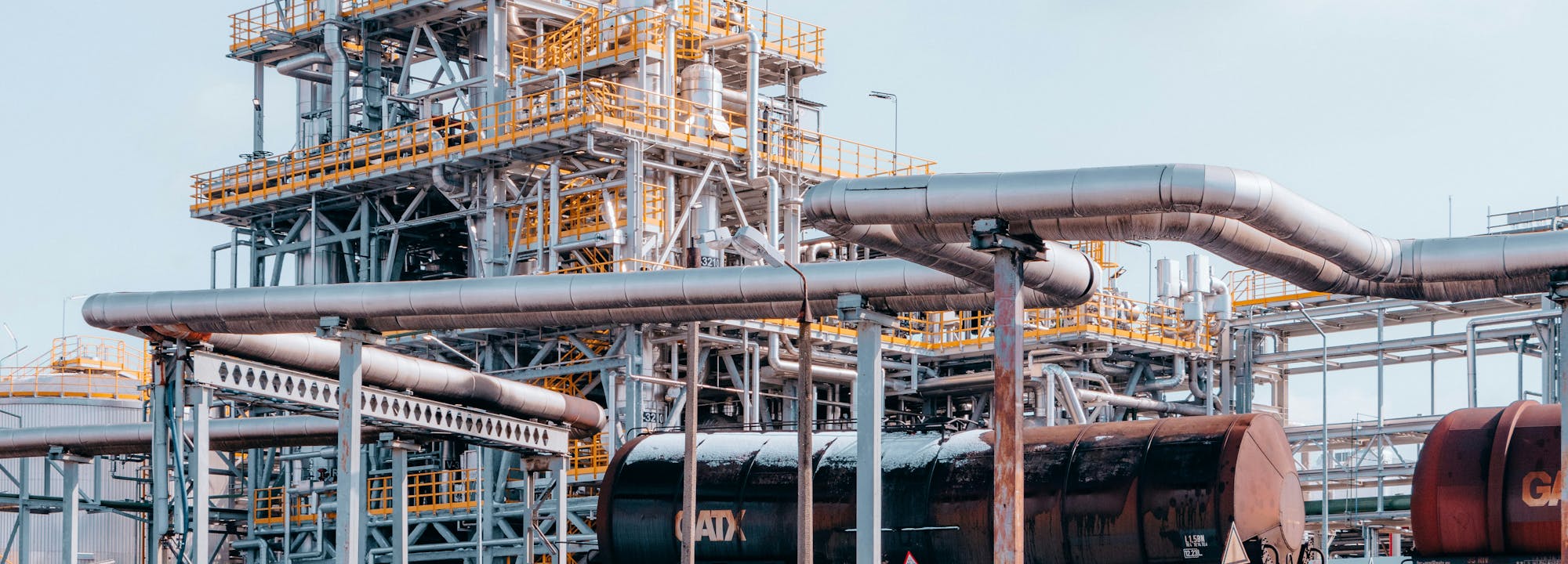Energy sector and refineries
Pursue alternative fuels, operational flexibility, compliance with emissions standards, and reduced reliance on crude oil

The global energy landscape is evolving rapidly, and refineries face increasing pressure to align with net-zero goals, reduce emissions, and adapt to stricter regulations. At Evergreen, we offer a proven path forward.
Our fast pyrolysis technology transforms biomass into renewable BioOil and BioChar—solutions that are compatible with existing refinery infrastructure. With BioOil, you can meet blending mandates, reduce dependence on crude oil, and future-proof your operations. BioChar offers additional benefits as a marketable carbon-negative product, enabling significant progress toward ESG goals and enhancing your climate-smart reputation.
4% global CO₂ emissions
Refineries are responsible for a significant share of industrial greenhouse gas emissions.
No SOx, low NOx
BioOil production and combustion improve air quality by eliminating sulfur oxides (SOx) and drastically reducing nitrogen oxides (NOx).
38% cost reduction
Refineries stand to save millions by replacing biodiesel and bioethanol with BioOil.
Why now?
Rising regulatory pressure
Emission standards and blending mandates are increasing globally, requiring refineries to integrate renewable fuels.
Net-zero goals
Many energy companies aim to achieve net-zero emissions by 2030 or 2050. BioOil provides a practical solution to meet these targets.
Green financing opportunities
Renewable projects qualify for government incentives, carbon credits, and ESG investments, creating financial and reputational benefits.
Market diversification
BioOil and BioChar allow refineries to reduce dependency on crude oil, diversify fuel streams, and enhance supply chain flexibility.
Future-proof energy production and operations
The energy sector faces increasing challenges as emission regulations tighten, and reliance on traditional fuels becomes less viable. Refineries must adapt to remain competitive, integrating renewable solutions that reduce carbon emissions and align with sustainability mandates.
Our fast pyrolysis technology provides a practical path forward, enabling refineries to incorporate BioOil into existing infrastructure, lower operational costs, and generate additional revenue through carbon credits, all while meeting regulatory and environmental targets.
Integrate BioOil into existing refinery processes as a low-carbon, high-value alternative to crude oil.
Meet and exceed emissions regulations while reducing your refinery’s carbon footprint by up to 800,000 tons of CO₂ annually per plant.
Leverage BioChar’s carbon sequestration capabilities to earn significant carbon credits—valued at up to $80 per ton of CO₂.
Evergreen plants are modular and can be deployed globally, tailored to regional biomass availability and refinery needs.
Replacing bioethanol and biodiesel with BioOil can save refineries up to 38% of input costs annually while accessing green financing and carbon markets.

BioOil and BioChar for the energy sector
Both and provide numerous benefits for refineries, from promoting a circular economy to improving environmental standards adherence.
Low emissions — Reduces greenhouse gas emissions by up to 70% compared to traditional fossil fuels.
Versatile applications — Used for blending, co-processing, and as a feedstock for renewable chemicals.
Energy dense — One ton of BioOil provides the energy equivalent of 12 tons of biomass.
Carbon sequestration — Locks two to three tons of CO₂ per ton of BioChar, qualifying for significant carbon credits.
Sustainable byproduct — Used in agriculture, water treatment, and renewable energy systems.
Refineries must adapt to the growing demand for sustainable energy or risk being left behind as the world accelerates towards net-zero emissions. Embracing technologies that integrate renewable fuels and lower carbon intensity is critical to future competitiveness.

Increase in co-firing of pyrolysis oil, globally
Leading global refineries are accelerating investments in pyrolysis oil co-processing and renewable projects to enhance energy security, comply with emissions regulations, and align with net-zero goals. Refineries are pursuing pyrolysis oil co-processing and renewable projects for strategic and financial reasons.
Meeting stringent environmental regulations by reducing greenhouse gas emissions.
Progressing toward carbon neutrality by incorporating renewable feedstocks.
Lowering reliance on traditional crude oil to mitigate market volatility and improve energy security domestically.
Diversifying energy sources to enhance operational resilience to reduce reliance on bioethanol, biodiesel and other food-crop based fuels.
Extending the lifespan of existing infrastructure through modernization.
How we develop projects
Feedstock assessment and sourcing
We assess available biomass feedstocks and develop a reliable sourcing strategy, working with established supply chains or assisting in identifying and securing appropriate feedstock to meet operational demands.
Technical feasibility and integration planning
Our engineers conduct a detailed analysis of your refinery’s infrastructure to ensure seamless integration of BioOil into existing processes. This includes co-processing compatibility assessments, refinery modifications, and operational impact studies.
Project development and financing
We provide a comprehensive development plan, outlining capital requirements, operational costs, and financing options to help secure green financing and explore potential carbon credit opportunities to support the project’s economic viability.
Implementation and operations support
Once operational, BioOil is delivered directly to your refinery or produced on-site through modular Evergreen plants. We provide ongoing technical support, ensuring consistent quality, operational efficiency, and compliance with emissions targets.
ESG reporting and carbon credit utilization
We help track environmental performance by providing detailed ESG reports to meet investor and regulatory requirements. BioChar produced during the process enables you to earn and trade carbon credits, offsetting emissions and enhancing profitability.